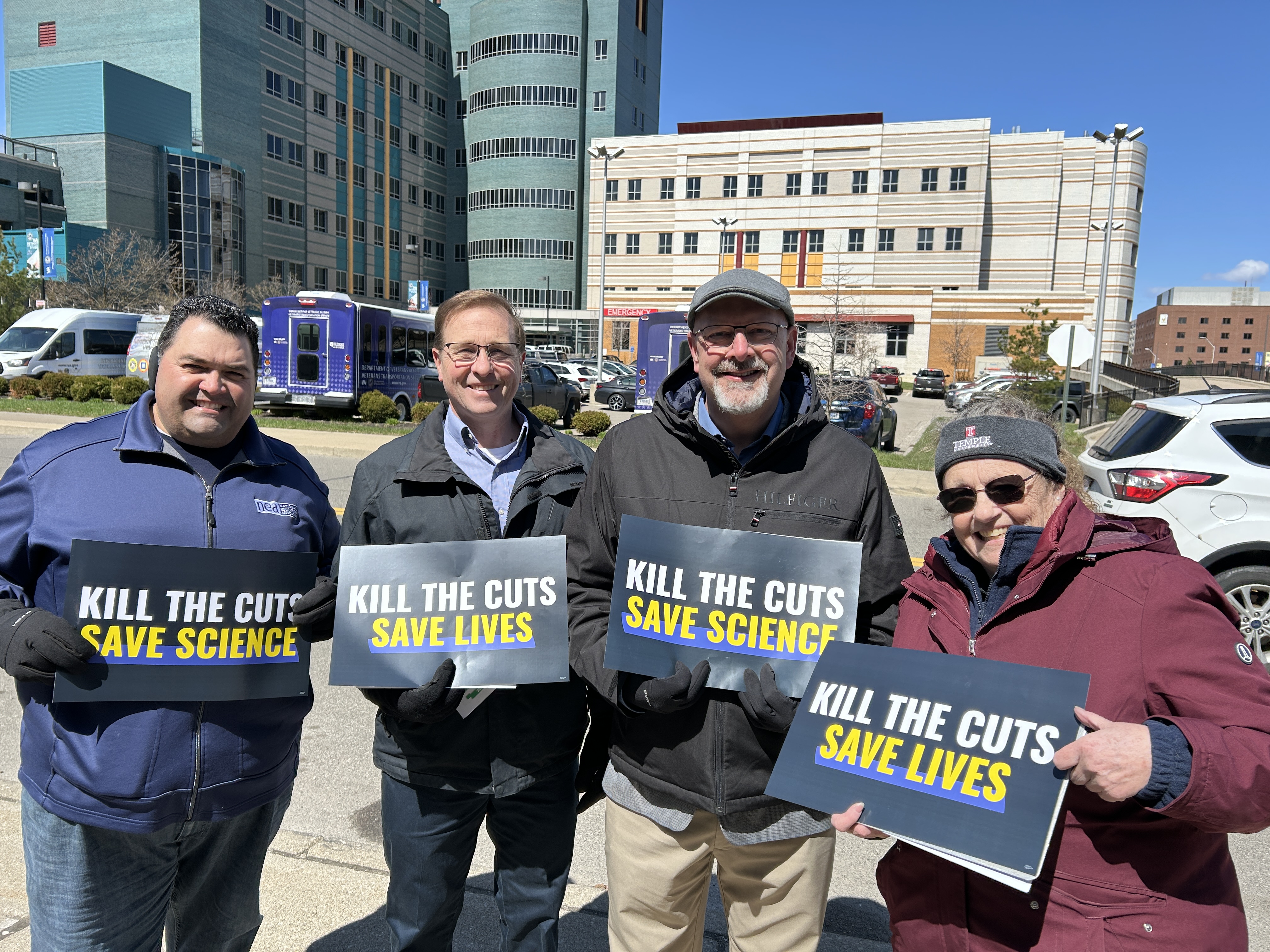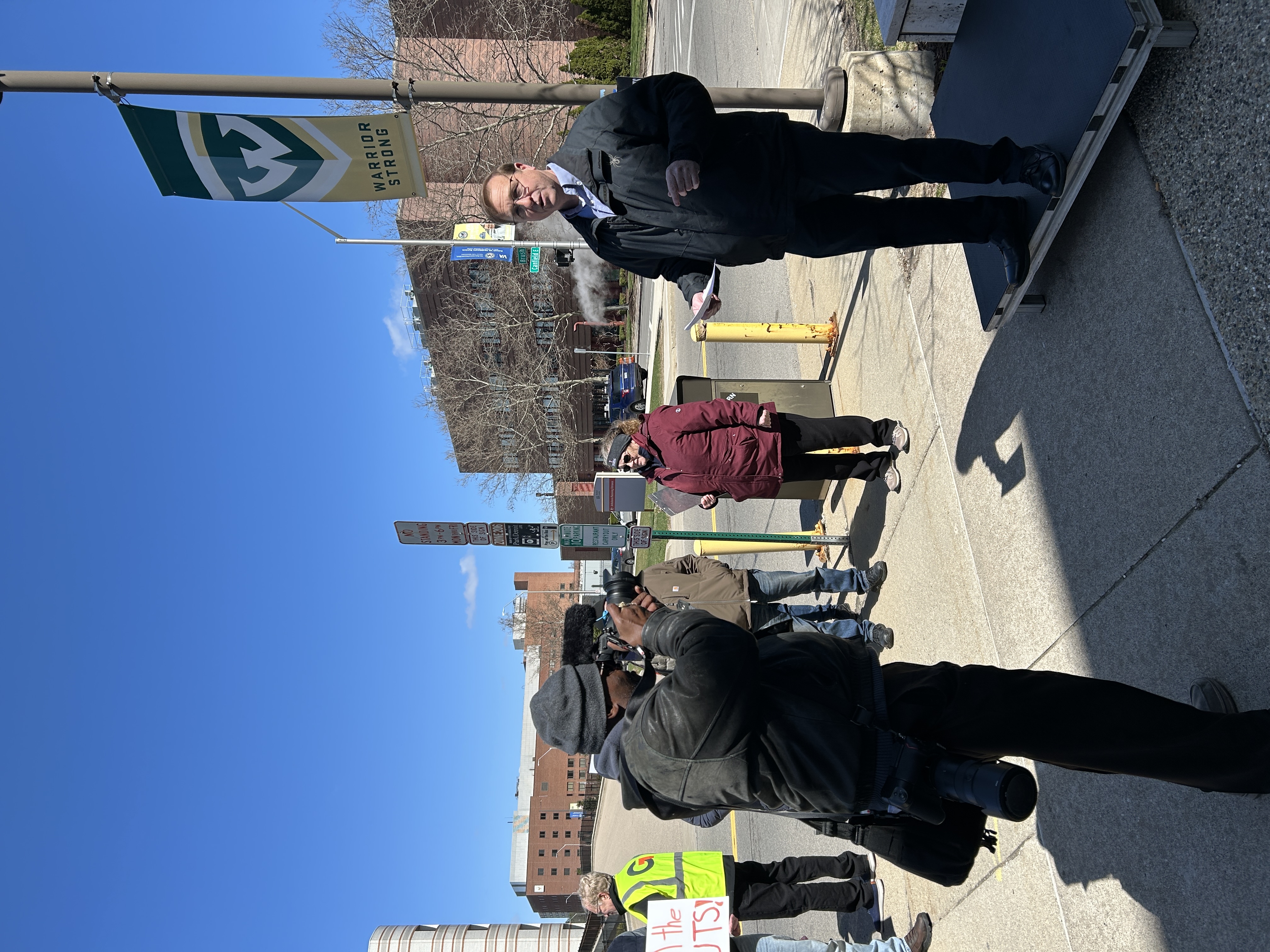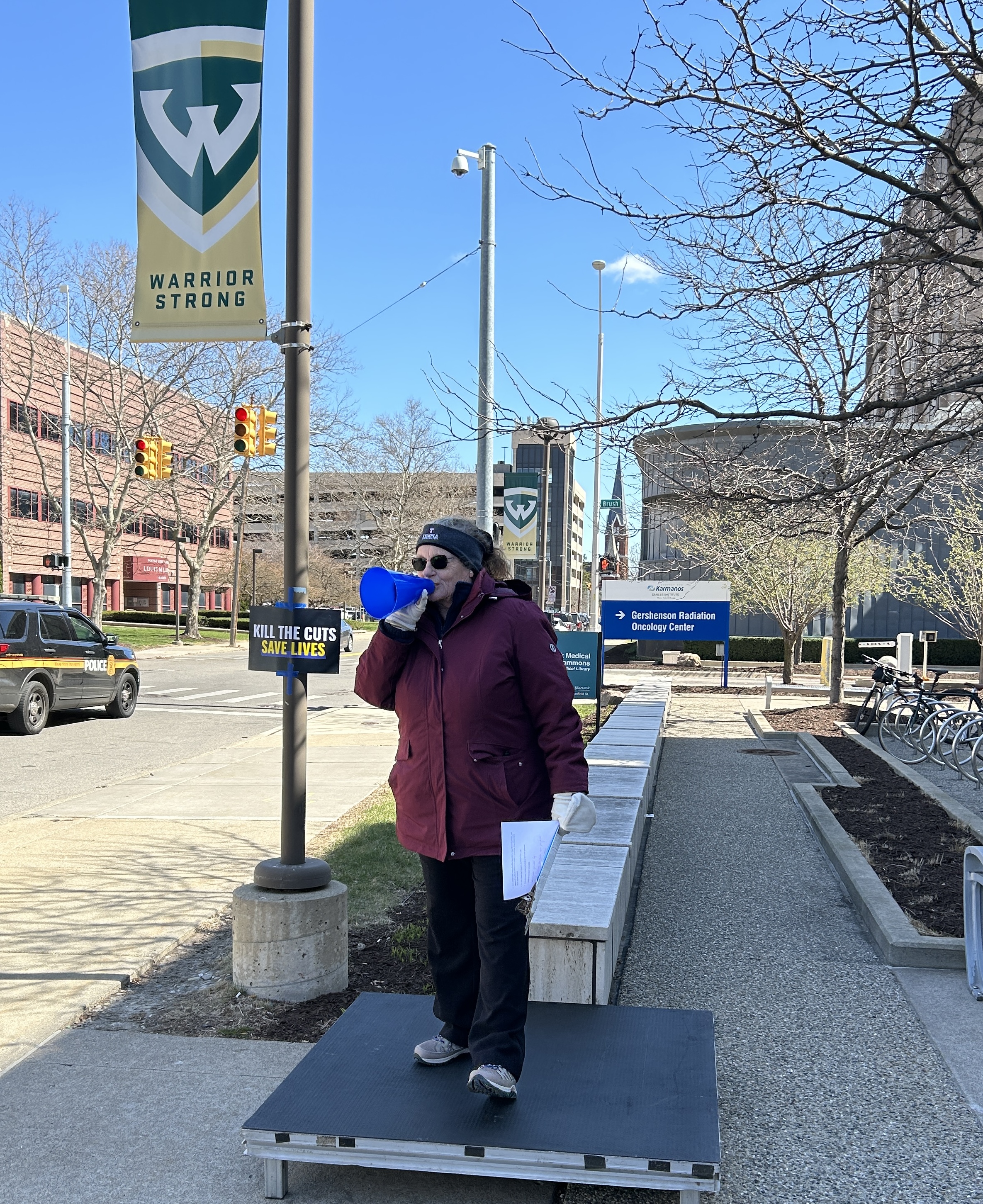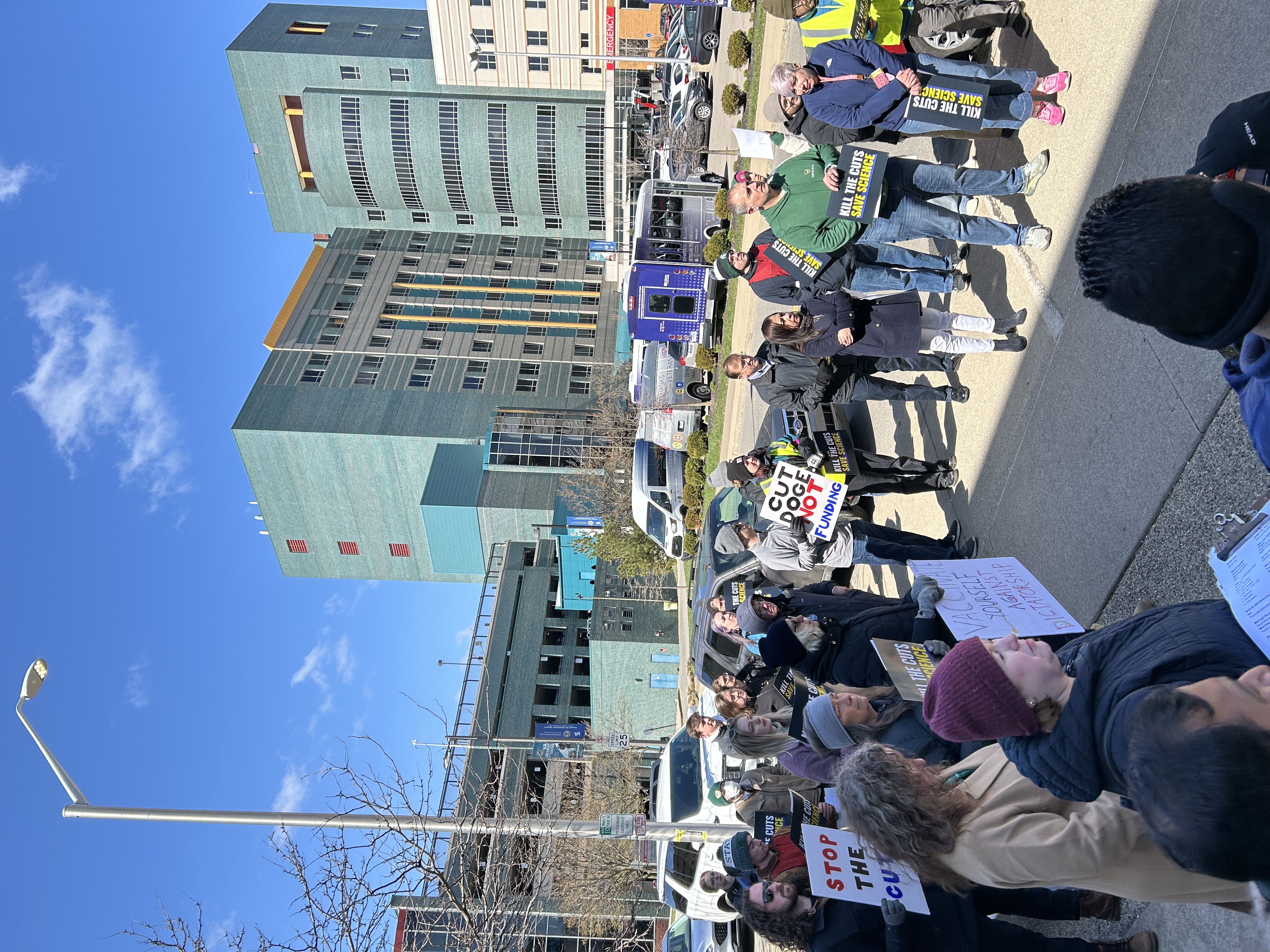Higher-ed protest by MEA & labor allies part of national action
By Brenda Ortega
MEA Voice Editor

Nearly 30 years from the start of his labor activism as a graduate student organizer, MEA member Alec Thomson returned to his union origins on the campus of Wayne State University on Tuesday to protest the Trump administration’s draconian cuts to higher education and medical research.
Now a union leader at the national level, Thomson brought a sense of urgency and historical perspective to a rally of professors, researchers and students held in freezing spring temperatures outside of Wayne State’s medical school — part of a National Day of Action called “Kill the Cuts.”
About 250 protesters turned out for a similar event at the campus of UCLA in Los Angeles.
The Trump administration’s cuts to the National Institutes of Health and National Science Foundation jeopardize medical research into health problems such as cancer, heart disease, and diabetes plaguing millions of Americans — projects both planned and underway.
“Limiting the work in these areas not only has immediate negative health consequences but creates a legacy of damage by limiting the education and training of tomorrow’s leaders in these critical areas,” Thomson told several dozen higher education researchers, professors and graduate students assembled for the event.
Defeating injustice is not quick or easy to do, a lesson he learned while organizing graduate teaching assistants at Wayne State in the 1990s, he said: “Success was achieved through collective effort with support from allies across campus and beyond.”

Last fall, Thomson — a history and political science professor at Schoolcraft College in Livonia — assumed a new national leadership role as president of the National Council for Higher Education, the council representing higher education members of NEA.
Yet no single leader, union or rally can ensure the survival of cutting-edge research, teaching and learning at our nation’s colleges and universities, Thomson added. “We must stand together and fight to preserve the funding for these institutions and their research. We need them, and they need you!”
Advocates spoke out at “Kill the Cuts” events at nearly three dozen university campuses across the country on Tuesday, calling attention to research that has improved health treatments, saved lives, and made the U.S. a global leader in medical breakthroughs.
The stakes couldn’t be higher, said Marcia Mackey, a professor of sports management at Central Michigan University who helped organize Tuesday’s event at Wayne State. Mackey took on a national union leadership post alongside Thomson last fall as vice president of NCHE.
“This is a fight we have to win — we won’t back down, and we won’t give in!”
Mackey urged the crowd to keep showing up and next time bring two friends. She also asked everyone to “Please help the international students,” as a number of them have had student visas revoked by the Trump administration without any warning or apparent cause, including in Michigan.
The issue was personal for NEA Secretary-Treasurer Noel Candeleria, a special education teacher from Texas, who came to the rally in Detroit as a show of solidarity. His own wife was saved by cutting-edge medical procedures perfected through investment in research, he said.
“The nation’s largest labor union, the National Education Association, is here to stand with educators and fight back against draconian cuts that are impacting every single community across this country,” Candeleria said. “We have to grow public awareness so we can grow this movement!”

MEA Vice President Brett Smith added the Trump administration is making deep and indiscriminate cuts to services that benefit the vast majority of Americans to benefit a small number of the wealthiest people in the country.
“No matter how many things they throw at us, no matter how many times they try to tell us we’re done, we are never done fighting for the children of this country,” Smith said.
Alexis, a PhD student at Wayne State studying new approaches for metastatic prostate cancer, spoke at the rally to say federal cuts were already having negative effects — not only in abruptly halted studies and clinical trials but in graduate students forced to turn away from desired career paths.
“I chose to become a researcher hoping one day my ideas would lead to life-saving treatments to improve the lives of people around me,” she said. “These cuts to NIH take this away from every researcher, and more importantly take away life-saving treatments from the public.”
The Trump administration’s attacks on NIH funding are part of a broader attack on the overall health economy that working families in every state rely on and have paid for — including Medicaid, Medicare, and Social Security.
The administration also is attempting to dismantle the U.S. Department of Education, which delivers resources to ensure students from cash-strapped rural and urban areas and those with disabilities can access opportunity through K-12 and higher education.
Although nearly two dozen states are challenging the federal funding cuts in court, uncertainty has led many universities to cancel research projects and positions.

Another education program funded through the U.S. State Department — the prestigious Fulbright Scholars program — hasn’t been spared from the Trump administration’s ax, said Stephen Covell, a professor in the Western Michigan University Department of World Religions and Culture who spoke at the rally.
Founded in 1946, the Fulbright is the U.S. government’s flagship international educational cultural exchange program and has produced 400,000 alumni, 61 Nobel Prize winners, 89 Pulitzer Prize winners, 41 current or former heads of state, and 16 Presidential Medal of Freedom recipients, Covell noted.
A two-time Fulbright Scholar, Covell returned in February from a five-month award in Japan. Other Fulbrighters since have been stranded mid-program by the sudden funding cuts, Covell said, adding Japan stepped in to cover remaining costs so American scholars studying there could complete their terms.
The Fulbright gives junior scholars the resources to conduct research and make connections across the globe they otherwise could not afford, which offers big payoffs, he said. “Many alumni establish partnerships that facilitate trade, investment, and job creation.”
Other scholars teach abroad and bring back enriched knowledge and skills that benefit students in the U.S. for years to come. “To cut something that makes such a lasting difference and promotes the best of what the U.S. can be is senseless, shortsighted and plainly just stupid,” Covell said.
Showing up to fight back is the first step in winning, state Rep. Donovan McKinney (D-Detroit) told rally goers. McKinney noted a similar education funding battle may be brewing in Michigan judging by signals from Republican leaders who took control of the state House in January.
“I need all of you to stick together in this fight,” he said. “Do not lose hope, because together we can overcome anything; together we can achieve anything; and together we will rise.”



